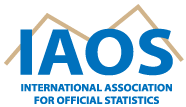A glimpse into the issue’s content:
(https://content.iospress.com/journals/statistical-journal-of-the-iaos/40/2),
Editorial – The 55th session of the UN Statistical Commission: promoting inclusivity and protecting statistical systems from political interference by Editor in Chief – Pietro Gennari
The editorial offers a
summary of the key outcomes and some reflections on the 55th session of the UN
Statistical Commission (UNSC), held this year from February 27 to March 1, at
the UN Headquarters in New York. This year’s event, which saw the participation
of over 600 experts from 129 countries, 45 regional and international agencies,
and 8 international NGO, produced a series of pivotal decisions that are
expected to have profound implications for the future of the global statistical
system. These decisions cover a wide variety of topics, from the expansion of
country’s membership, to methodological enhancements in various statistical
domains, to the establishment of working groups for the discussion and
development of statistical standards in new areas.
First and foremost,
however, the fifty-fifth session of the Commission was the occasion to celebrate
the 30th anniversary of the endorsement of the UN Fundamental Principles of
Official Statistics (FPOS) by the Commission itself and the 10th anniversary of
their approval at the highest political level, by the UN General Assembly. With
the objective of strengthening their implementation at country level, the
Commission discussed the proposals to establish an Independent Advisory Board
on the FPOS (IAB) and to revise the FPOS Implementation Guidelines. After a lengthy
debate, the Commission chose to put on hold the creation of the IAB, until
revised terms of reference, membership and criteria for the selection of
experts were decided ‘through a transparent and inclusive consultation
process’.
The strong disagreement
expressed during the session on the formulation of the ToR of the IAB on the FPOS
and its proposed membership reflects the opposition of countries to the
establishment of a perceived watchdog that would have interfered in their
sovereignty and national prerogatives. While countries supported the IAB’s
advocacy and guidance role, they were wary of its monitoring function. However,
removing from the ToR of the Independent Advisory Board the whistleblower’s
responsibility to address any episode of non-compliance with the FPOS, leaves a
huge gap in its assurance framework as there would be no international
mechanism that has the authority to call the attention of the global
statistical community and their institutions to these infringements of the
FPOS.
Political interference and,
more generally, any form of political pressure in official statistics pose
significant threats to the integrity, credibility, and utility of statistical
data. The system currently implemented for monitoring and enforcement of the UN
FPOS at global level, based on the survey carried out every ten years by UNSD,
is inherently weak, episodic, and bound to provide a rosier perspective on
their actual application. In fact, the survey is based on a self-assessment
questionnaire, which relies completely on data provided by national statistical
offices and political authorities. Self-assessment practices should be
supplemented by external examination, verification, and follow-up monitoring
conducted by an independent party to ensure a higher level of quality from a
global perspective, given that official statistics are a global public good
serving the needs of the entire global community, not only those of national
policy-makers or national stakeholders. For these reasons, establishing an
independent advisory body to the UN Statistical Commission has the potential to
mitigate the risks of political interference and strengthen the integrity of
official statistics. Certainly, careful consideration must be given to its
mandate, membership, and operational mechanisms to ensure its effectiveness and
legitimacy. Collaboration with member states will be essential in navigating
the complexities and challenges of implementing such a body successfully.
Interview with Stefan
Schweinfest
Now, turning our attention
to the content of the Journal, the latest issue of the SJIAOS, starts with an
insightful interview with Stefan Schweinfest, director of the UN Statistics
Division, carried out by Pieter Everaers. In this interview, Stefan Schweinfest
talks about his career and professional milestones, discussing the evolving
responsibilities of the UN Statistics Division in response to the increased
complexity of the data ecosystem landscape. He also elaborates on the
contribution of the SDGs to the development of national statistical systems,
the emergence of the Geographic Information System community, and the important
role of the UN Fundamental Principles for Official Statistics for the global
statistical system.
Special Section: The
Future of Agricultural Statistics
The core of the June issue
is dedicated to the Future of Agricultural Statistics. This section of the
Journal, organized by Linda J. Young as Guest Editor, comprises twelve papers
selected from those presented at the ninth International Conference on
Agricultural Statistics (ICAS IX), which was held at the World Bank
headquarters in Washington, DC, on May 17–19, 2023. The selected papers explore
various themes and advancements shedding light on the latest innovations as
well as on the changing needs and prospects that are going to shape the future
of agricultural statistics. These twelve papers cover a wide array of topics: from
discussions on modernization efforts within National Statistical Offices, to
the incorporation of machine learning algorithms in agricultural surveys; from
the analysis of household consumption data for food security, to the assessment
of climate change impacts on water resources.
Surveys in Times of
COVID-19 and in Difficult Settings
This section includes two
papers: the first one examines the impact of the changes in the survey data collection
methods adopted by Statistics Netherlands in response to the disruption of
face-to-face interviews caused by the COVID pandemic; while the second paper is
a simulation study aimed at addressing the challenges of sampling in difficult
settings, particularly when little is known about the population being
surveyed.
Time Series Analysis
This section comprises five
papers that delve into various aspects of time series analysis and its
applications in economic research and forecasting. The focus shifts to
exploring innovative methodologies and data sources to enhance forecasting
accuracy and gain fresh insights into economic dynamics.

